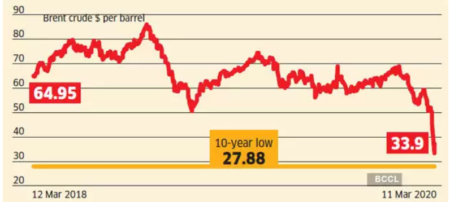
We, Divyanshu Kulkarni and Sandeep Ambarasu from the IFIM Business School, would today like to share with you some insights and facts about how the COVID-19 outbreak has affected the Indian Economy. This all started in Wuhan, China in the month of December 2019. The first case came to light in India on 30th January 2020 in Kerala.
The Drug Controller General of India has granted approval to the Indian Council of Medical Research to use lopinavir and ritonavir in a combination before the coronavirus disease in India turns into a public health emergency. To check for the Coronavirus symptoms, active thermal screening has been successfully installed at 21 airports including those in Delhi, Mumbai, Bengaluru, Kolkata, Hyderabad, Chennai,and Cochin. Universal screening has been made compulsory for flights from most countries at the aero-bridges which are ear-marked for the purpose.
Due to several measures including the lockdown that has been initiated in several Indian cities; non-essential businesses have been closed while customer traffic has reduced substantially. Several companies have advised their employees to work-at-home taking their safety into consideration.
This will surely impact the domestic economy over the next several months.
Additionally, because of the effect of the current pandemic on almost all the countries in the world, the global economy is certainly going to be affected adversely. Since India is also integrated in the global supply chain, it’s economy is also likely to take a hit.
With China under lockdown, second largest population, India is also expected to witness a significant impact on imports and exports in various industries including the likes of pharmaceuticals, electronics, mobiles, and auto parts. In terms of ranking for major exporters to India, China ranks first, followed by the US and UAE. In 2018, accounting for 14.63% of the exports, China exported goods worth USD 90.4bn to India.
In 2017, telecom instruments, computer hardware and peripherals, electronics components, industrial machinery for dairy purpose and the organic chemicals were the top five categories of imports by India which accounted for 46% of the imports from China.
As a result, Indian companies are already feeling the effect of lack of input from their Chinese suppliers. Simultaneously, their exports to other countries are impacted due to the slowdown in the global economy.
Domestic benchmarks like BSE Sensex and NSE Nifty had the worst week in a span of 10 years. On Wednesday (i.e. 18th March), Sensex closed at 28,896 points after crashing 1709 points while Nifty went below 8,500 points being the lowest in the past three years.
Analysts on Dalal Street say that the markets in India will remain extremely subdued for at least two months even if India takes adequate steps to contain this pandemic. The effects could be worse if the outbreak spreads as it has in several other countries like the US and France. This volatility is impacting the portfolios and plans of most investors today. In such cases, it is essential for market investors to clarify with the experts before making any noteworthy moves.
In such uncertain times investors generally prefer safety over high returns. Therefore, gold prices are more likely to increase and this trend is already visible in the Indian markets as investors moved to safe haven assets in a risk-off environment amidst the rising coronavirus cases in India and abroad. On 18th March, the gold futures went up by 0.09% to Rs.40,280 per 10 grams and the silver futures went up 1.26% to Rs.35,900 per kg.

Perhaps the only positive for the Indian economy in the current situation is the sharp fall in oil prices. The demand by the Organisation of Petroleum Exporting Countries (OPEC) to restrict the further production from the month of April was rejected by Russia. It resulted in the scrapping of the current restrictions. As a result of the breakdown of the agreement between OPEC and Russia, Saudi Arabia increased their oil production by a huge percentage. Due to the coronavirus pandemic, Increasing production at a time when demand is low is not good for the crude oil market. However, this bodes well for India since India is a large importer of oil.
Overall while the health ministry is doing all they can to contain the COVID-19 outbreak a substantial impact on the Indian economy is inevitable!
To know more about IFIM Business School, Join [OFFICIAL] IFIM Business School PGDM Admission Related Queries 2020-22 | PaGaLGuY
